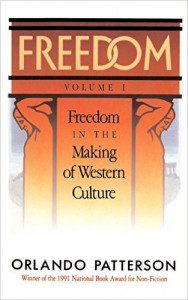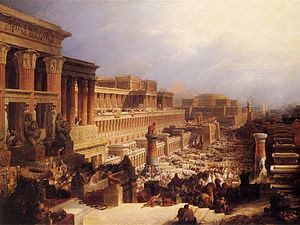
Slavery is an ignominious fact of history.
Historically it was also well-nigh universal. I know you’ve heard otherwise, but its universality is simply another fact. Western civilization didn’t invent slavery. In fact, civilization itself didn’t invent slavery. Some of the most degrading forms slavery has taken developed within hunter-gatherer communities.
I learned these things years ago when I read the best treatment of the subject that I have come across, Orlando Patterson’s, Freedom in the Making of Western Culture. (It won the National Book Award in 1991.)
Patterson is a social historian at Harvard University. He is also a descendant of slaves. (He was born in Jamaica.)
Based upon what I learned from Patterson I think its safe to say we’re all the descended from slaves. Somewhere, at some point in the dim past, your ancestors were slaves.
Early on in the book Patterson recounts his dismay when he learned that slavery was a universal institution, while freedom has a very particular and surprising provenance. What we know as freedom today arose in the West, in the very civilization that many people make a good living denigrating. (And the civilization that happens to give them that living!)
But here’s another surprising thing that Patterson reveals: it is the experience of slavery that served as a midwife for the value of freedom. That shouldn’t surprise anyone familiar with the Bible. It was bondage in Egypt that served as the womb for the nation of Israel. Exodus is the story of their liberation.

How odd then that they should have permitted slavery. Or so it seems to us, anyway. And I think it is this same inconsistency that bothers many people today when we read the household codes of the New Testament. Those codes made room for slavery. Why didn’t Christians simply free their slaves? Why didn’t Paul command them to? What’s all this about obey your masters?
While I’m sure that many Christian slave owners continued holding slaves for bad reasons, and while it is true that over time the emphasis on spiritual freedom in Christianity provided a theological basis for challenging the institution, still here in the New Testament we have codes telling slaves to obey their masters.
What do we do with that? No one is saying we should bring slavery back–no one we should listen to anyway. More important for me though is the claim that the codes are defunct because they make provision for slavery. Is that right?
I think the place to begin is with the fact that I noted above: historically slavery was a nearly universal institution. And something doesn’t get to be universal unless it solves certain problems.
I think we all know what one of those problems is: the problem of cheap labor.
But is that all there is to it? That addresses the demand side of things, but what about the supply? Sure, people could be born into slavery and you can wage war to acquire slaves. But it runs deeper.
This is another place where Patterson proved helpful to me. He notes that the other thing you need for slavery to spontaneously emerge is social displacement. Here’s how Patterson puts it:
“Slavery is the permanent, violent, and personal domination of natally alienated and generally dishonored persons. …(A slave) does not belong to the legitimate social or moral community.” pp. 9-10
Social displacement can happen in many ways: warfare (as I’ve already noted), natural disasters, economic insolvency, and so it goes, ad infinitum. When people are displaced in the thousands of ways that can happen, the problem for society is the problem of re-placement. Where do you put these people? There are relatives, of course. But what if they’ve been displaced too? Or maybe there’s just no more room?
Most people don’t think along these lines today. Individualism blinds us to a plain fact Aristotle noted: we’re social animals. We truly do need other people. Furthermore, many of the social institutions we take for granted could only have come into being in an advanced industrial civilization like ours. (Think of where all those charities and government social services we rely upon would be without fractional banking or taxes levied on highly productive businesses. They just wouldn’t exist. We couldn’t afford them.)
The cultures of antiquity in the near east and in Europe didn’t have those things. They were made up largely of hardscrabble households. When displaced persons needed somewhere to go, it was houses that took them in. (Naturally an economic institution arose to help that happen: the slave market.)
Some slave holding households could be quite large. The houses of the Patricians in Rome for example, or the house of Pharaoh in Egypt. But you see the point.
And once you’re brought into a household there’s the whole problem of where to put you in the hierarchy. You don’t suppose the folks who are already there are keen on being displaced themselves, do you? And what about inheritance? How do these newcomers fit into the long term prospects of a household?
So you see, taking people into households solved the displacement problem. But it created new problems. and the answer to those problems was slavery. A slave was a person who contributed to the economic livelihood of a household without enjoying ownership or inheritance rights. That was a problem for the slaves, but freemen generally didn’t feel like that was their problem to solve.
Hopefully this is beginning to make a little sense. Abolishing slavery is a little more complicated than just legislating it away. Slavery solved problems. To abolish slavery for good you must find new solutions for those problems.
And this is what western civilization has done. After many fits and starts and a lot of bloodshed over many centuries, we’ve managed to do it. But I suspect that the only way to keep slavery abolished is by keeping the institutions that have replaced it healthy. Lose those and slavery will be back.
I think that means we can keep households without keeping slaves. The work they once performed is now being done by machines and by wage laborers. And those resources are largely being put to work in large business corporations.
That’s the economic and political tale of slavery condensed for you. I’ve left a lot out that you can read about elsewhere. But the inclusion of slavery in the New Testament household codes shouldn’t invalidate them. Since a functional household does not necessitate the holding of slaves, the household codes on the subject of slavery have nothing to say to us.
Or do they?
Next Thursday I’ll return to the subject of slavery in the household codes in order to show you why its presence in the codes is actually a blessing in disguise. Slavery comes in many forms, you know. We were all born into slavery, whether we know it or not.












